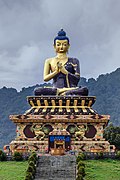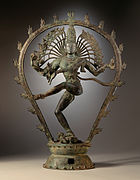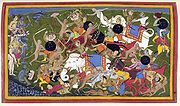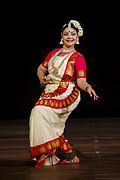| Revision as of 18:40, 22 July 2023 editFowler&fowler (talk | contribs)Autopatrolled, Extended confirmed users, File movers, Pending changes reviewers, Rollbackers63,051 edits →Gandhi: ReplyTag: Reply← Previous edit | Revision as of 18:48, 22 July 2023 edit undoFowler&fowler (talk | contribs)Autopatrolled, Extended confirmed users, File movers, Pending changes reviewers, Rollbackers63,051 edits →Gandhi: ReplyTag: ReplyNext edit → | ||
| Line 291: | Line 291: | ||
| :And I owe you big time. Big time. ]] 18:40, 22 July 2023 (UTC) | :And I owe you big time. Big time. ]] 18:40, 22 July 2023 (UTC) | ||
| ::PS In case some revamped Hindu nationalist nosy parkers are looking in this exchange for gleanings of meatpuppetry, its conspiracy or promise, it is just another way of saying, "Thank you for the effort." ]] 18:48, 22 July 2023 (UTC) | |||
Revision as of 18:48, 22 July 2023
| Reiterating as much for myself as for others that for the next several months I shall be working on three articles, Mandell Creighton, Company rule in India, and History of English grammars. They have been on my backburner far too long. My time for all other activities on Misplaced Pages will be severely restricted. |
This user is aware of the designation of the following topics as contentious topics:
|
|
Archives |
|
1, 2, 3, 4, 5, 6, 7, 8, 9, 10 |
|
This page has archives. Sections older than 10 days may be automatically archived by Lowercase sigmabot III. |
India-related FPs I
-
 Indian vultures, (Gyps indicus), in a nest on the tower of the Chaturbhuj Temple, Orchha, Madhya Pradesh. The vulture became nearly extinct in India in the 1990s from having ingested the carrion of diclofenac-laced cattle.
Indian vultures, (Gyps indicus), in a nest on the tower of the Chaturbhuj Temple, Orchha, Madhya Pradesh. The vulture became nearly extinct in India in the 1990s from having ingested the carrion of diclofenac-laced cattle. 
-
 The bank myna is indigenous to the Indian subcontinent.
The bank myna is indigenous to the Indian subcontinent. 
-
 The vulnerable Malabar frog is endemic to the Western Ghats.
The vulnerable Malabar frog is endemic to the Western Ghats.
-
 The endangered Nilgiri tahr is endemic to the Western Ghats. Shown here is a female in a national park in Kerala.
The endangered Nilgiri tahr is endemic to the Western Ghats. Shown here is a female in a national park in Kerala. 
India-related FPs II
-
 The brahminy kite (Haliastur indus) hunts for fish and other prey near the coasts and around inland wetlands.
The brahminy kite (Haliastur indus) hunts for fish and other prey near the coasts and around inland wetlands. 
-
 The lotus (Nelumbo nucifera) is the Indian national flower. Hindus and Buddhists regard it as a sacred symbol of enlightenment.
The lotus (Nelumbo nucifera) is the Indian national flower. Hindus and Buddhists regard it as a sacred symbol of enlightenment. 
-
 The Indian peafowl (Pavo cristatus) is the Indian national bird. It roosts in moist and dry-deciduous forests, cultivated areas, and village precincts.
The Indian peafowl (Pavo cristatus) is the Indian national bird. It roosts in moist and dry-deciduous forests, cultivated areas, and village precincts. 
-
 The Pahalgam valley in Jammu and Kashmir is covered with a temperate coniferous forest.
The Pahalgam valley in Jammu and Kashmir is covered with a temperate coniferous forest. 
India-related FPs III
-
A Toda tribal hut exemplifies Indian vernacular architecture.

-
 Bangles on display in Bangalore India
Bangles on display in Bangalore India 
-
 A Sadhu and a picture of Siva in Kayasth Tola, Varanasi, Uttar Pradesh in Northern India
A Sadhu and a picture of Siva in Kayasth Tola, Varanasi, Uttar Pradesh in Northern India 
-
 The pushkarani, or tank, located on the eastern side of Krishna temple in Hampi, Karnataka, the seat of the Vijayanagara Empire
The pushkarani, or tank, located on the eastern side of Krishna temple in Hampi, Karnataka, the seat of the Vijayanagara Empire 
India-related FPs IV
-
 Large Gautama Buddha statue in Buddha Park of Ravangla, Sikkim
Large Gautama Buddha statue in Buddha Park of Ravangla, Sikkim 
-
 A Jain woman washes the feet of Bahubali Gomateswara at Shravanabelagola, Karnataka. The Bahubali idol is 18 metres (58 ft) high and is carved out of a single rock on top of a hill.
A Jain woman washes the feet of Bahubali Gomateswara at Shravanabelagola, Karnataka. The Bahubali idol is 18 metres (58 ft) high and is carved out of a single rock on top of a hill. 
-
 A Chola bronze depicting Nataraja, who is seen as a cosmic "Lord of the Dance" and representative of Shiva
A Chola bronze depicting Nataraja, who is seen as a cosmic "Lord of the Dance" and representative of Shiva 
-
 A sixteenth century rendering of a scene from the Ramayana, an ancient Sanskrit epic.
A sixteenth century rendering of a scene from the Ramayana, an ancient Sanskrit epic. 
India-related FPs V
-
 Paintings at the Ajanta Caves in Aurangabad, Maharashtra, 6th century
Paintings at the Ajanta Caves in Aurangabad, Maharashtra, 6th century 
-
 The Agasthiyamalai range, constituting the southern end of the Western Ghats, as seen from the rainshadow region of the southwest monsoon in Tirunelveli, Tamil Nadu.
The Agasthiyamalai range, constituting the southern end of the Western Ghats, as seen from the rainshadow region of the southwest monsoon in Tirunelveli, Tamil Nadu. 
-
 A beach off the Arabian Sea in Puvar, Kerala. The Arabian Sea is the northwestern region of the Indian Ocean, bounded by the Arabian and Indian peninsulas.
A beach off the Arabian Sea in Puvar, Kerala. The Arabian Sea is the northwestern region of the Indian Ocean, bounded by the Arabian and Indian peninsulas. 
-
Flowing through its rocky terrain near Hampi is the Tungabhadra river, the major right bank tributary of the Krishna river, a peninsular river, which empties into the Bay of Bengal. The coracles, made of wicker, are traditionally covered with hide, their circular shape preventing them from overturning in rivers with rocky outcrops.

India-related FPs VI
-
 The recycling industry in India, a Varanasi paper bag seller
The recycling industry in India, a Varanasi paper bag seller 
-
 An example of the Chinese fishing nets of Cochin. Fisheries in India is a major industry in its coastal states, employing over 14 million people. The annual catch doubled between 1990 and 2010.
An example of the Chinese fishing nets of Cochin. Fisheries in India is a major industry in its coastal states, employing over 14 million people. The annual catch doubled between 1990 and 2010. 
-
 A tea garden in Sikkim. India, the world's second largest-producer of tea, is a nation of one billion tea drinkers, who consume 70% of India's tea output.
A tea garden in Sikkim. India, the world's second largest-producer of tea, is a nation of one billion tea drinkers, who consume 70% of India's tea output. 
-
A daily wage worker in a salt field. The average minimum wage of daily labourers is around Rs.100 per day

India-related FPs VII
-
 A bharatnatyam concert in 2014
A bharatnatyam concert in 2014 
-
 A Bondo woman walks to a weekly market in Chhattisgarh.
A Bondo woman walks to a weekly market in Chhattisgarh. 
-
A woman in Bundi, Rajasthan

-
 An ascetic in Varanasi, Uttar Pradesh
An ascetic in Varanasi, Uttar Pradesh 
India-related FPs VIII
-
 The tomb of Itmad Ud Daulah, Agra,
The tomb of Itmad Ud Daulah, Agra, 
-
 A Hindu bride
A Hindu bride 
-
 The interior of San Thome Basilica, Chennai, Tamil Nadu. Christianity is believed to have been introduced to India by the late 2nd century by Syriac-speaking Christians.
The interior of San Thome Basilica, Chennai, Tamil Nadu. Christianity is believed to have been introduced to India by the late 2nd century by Syriac-speaking Christians. 
-
 A Sikh pilgrim at the Harmandir Sahib, or Golden Temple, in Amritsar, Punjab
A Sikh pilgrim at the Harmandir Sahib, or Golden Temple, in Amritsar, Punjab 
India-related Classic Pictures-I
-
 A farmer in Rajasthan milks his cow. Milk is India's largest crop by economic value. Worldwide, as of 2011, India had the largest herds of buffalo and cattle, and was the largest producer of milk.
A farmer in Rajasthan milks his cow. Milk is India's largest crop by economic value. Worldwide, as of 2011, India had the largest herds of buffalo and cattle, and was the largest producer of milk.
-
 Indian agriculture dates from the period 7,000–6,000 BCE, employs two thirds of the national workforce, and is second in farm output worldwide. Above, a farmer works an ox-drawn plow in Kadmati, West Bengal.
Indian agriculture dates from the period 7,000–6,000 BCE, employs two thirds of the national workforce, and is second in farm output worldwide. Above, a farmer works an ox-drawn plow in Kadmati, West Bengal.
-
 Schoolchildren in Chambal, Madhya Pradesh eating a mid-day meal. The Mid-Day Meal Scheme attempts to lower rates of childhood malnutrition in India.
Schoolchildren in Chambal, Madhya Pradesh eating a mid-day meal. The Mid-Day Meal Scheme attempts to lower rates of childhood malnutrition in India.
-
 Cricket is the most popular game among India's masses. Shown here is an instance of street cricket.
Cricket is the most popular game among India's masses. Shown here is an instance of street cricket.
India-related FPs IX
-
 Asfi Masjid at the Bara Imambara complex, Lukcnow, India
Asfi Masjid at the Bara Imambara complex, Lukcnow, India 
-
 Chhota Imambara, Lucknow, India
Chhota Imambara, Lucknow, India 
-
 Taj Mahal mosque, Agra, India
Taj Mahal mosque, Agra, India 
-
 Bangalore panorama
Bangalore panorama 
India-related FPs X
-
 Red Weaver ant, Oecophylla smaragdina in Bangalore, India
Red Weaver ant, Oecophylla smaragdina in Bangalore, India 
-
 Female Telamonia dimidiata in the Lalbagh Botanical gardens, Bangalore, India
Female Telamonia dimidiata in the Lalbagh Botanical gardens, Bangalore, India 
-
 Mysore Palace in the morning
Mysore Palace in the morning 
-
 Indian Olympic athlete, Irfan Kolothum Thodi
Indian Olympic athlete, Irfan Kolothum Thodi 
India-related FPs XI
-
 Grammodes geometrica, Bangalore, India
Grammodes geometrica, Bangalore, India 
-
 Mumtaz Ahmed Khan founder of Al-Ameen Educational Society
Mumtaz Ahmed Khan founder of Al-Ameen Educational Society 
-
 Al-Ameen College of Pharmacy, Bangalore, India
Al-Ameen College of Pharmacy, Bangalore, India 
-
 Kumar Anish, Indian yoga specialist
Kumar Anish, Indian yoga specialist 
India-related FPs XII
-
 Taj Mahal at the golden hour
Taj Mahal at the golden hour 
-
 Bara Imambara, Lucknow, India
Bara Imambara, Lucknow, India 
-
 Salman Khurshid, Indian politician belonging to the Indian National Congress
Salman Khurshid, Indian politician belonging to the Indian National Congress 
-
 Indian palm squirrel, Bangalore, India
Indian palm squirrel, Bangalore, India 
India-related FPs XIII
India-related FPs XIV
-
Chandiroor Divakaran

-
 Karnataka High Court, Bangalore
Karnataka High Court, Bangalore 
-
 Dharmaraya Swamy Temple a Hindu temple in Bangalore
Dharmaraya Swamy Temple a Hindu temple in Bangalore 
-
 Bangalore Town Hall
Bangalore Town Hall 
Buddha related FPs I
-
 Battered religious figures stand watch on a hill above a tattered valley. Nagasaki, Japan. September 24, 1945
Battered religious figures stand watch on a hill above a tattered valley. Nagasaki, Japan. September 24, 1945 
-
 17th century Painting on cloth of of Buddha Shakyamuni as Lord of the Munis with Bodhisatvas in background.
17th century Painting on cloth of of Buddha Shakyamuni as Lord of the Munis with Bodhisatvas in background. 
-
 The Gathering of Four Buddhas. 1562 CE, National Museum of Art, Korea.
The Gathering of Four Buddhas. 1562 CE, National Museum of Art, Korea. 
-
 Two women walk past the huge cavity where one of the ancient Buddhas of Bamiyan used to stand, June 17, 2012. The monumental statues were built in A.D. 507 and 554
Two women walk past the huge cavity where one of the ancient Buddhas of Bamiyan used to stand, June 17, 2012. The monumental statues were built in A.D. 507 and 554 
Buddha related FPs II
-
 Monk walks in the morning after the rain in front of the Temple of the Emerald Buddha (Wat Phra Kaew), part of the Grand Palace, Bangkok, Thailand.
Monk walks in the morning after the rain in front of the Temple of the Emerald Buddha (Wat Phra Kaew), part of the Grand Palace, Bangkok, Thailand. 
-
Buddha Amitabha in His Pure Land of Suvakti, Central Tibet. 18th century; Ground mineral pigment on cotton

-
 English: Shakyamuni Buddha with Avadana Legend Scenes. Tibet. Date 19th century
English: Shakyamuni Buddha with Avadana Legend Scenes. Tibet. Date 19th century 
-
 Chiang Mai, Thailand: Buddhist Manuscript Library and Museum
Chiang Mai, Thailand: Buddhist Manuscript Library and Museum 
Things to do on 6/10/22
- Start the article Singrauli estate (see Wikipedia_talk:Noticeboard_for_India-related_topics#Cleaning_up_confusions_about_"Singrauli_State"
- Start something on the Ethnic fermented foods and beverages of the Darjeeling Hills, using
- Thapa, Namrata; Tamang, Jyoti Prakash (2020), "Ethnic Fermented Foods and Beverages of Sikkim and Darjeeling Hills (Gorkhaland Territorial Administration)", in Tamang, Jyoti Prakash (ed.), Ethnic Fermented Foods and Beverages of India: Science History and Culture, Singapore: Springer Nature, ISBN 978-981-15-1485-2 and
- Tamang, Jyoti P.; Sarkar, Prabir K; Hesseltine, Clifford W (1988). "Traditional Fermented Foods and Beverages of Darjeeling". Journal of the Science of Food and Agriculture. 44 (4): 375–385. doi:10.1002/jsfa.2740440410.
- Add something on Tibetan refugees in Darjeeling.
The relevant news, June 24, 2022
Nomination for deletion of Template:Fowler image rotation
![]() Template:Fowler image rotation has been nominated for deletion. You are invited to comment on the discussion at the entry on the Templates for discussion page. – Jonesey95 (talk) 15:49, 6 July 2023 (UTC)
Template:Fowler image rotation has been nominated for deletion. You are invited to comment on the discussion at the entry on the Templates for discussion page. – Jonesey95 (talk) 15:49, 6 July 2023 (UTC)
- @Jonesey95: I only just saw your notice. I don't remember this template; it was probably some fledgling effort of mine. So, no big deal. Thanks. Fowler&fowler«Talk» 12:40, 16 July 2023 (UTC)
Request
Hello Fowler&Fowler! While patrolling new pages, I saw several pages that were formed by duplicating some existing articles, and I nominated some of them for AFD. I requested help on Misplaced Pages's Discord channels to check the reliability of these pages, and someone suggested I contact you. Could you please examine the sources of the Chalukiya and Chandela clan articles? These two articles appear to be clones of the Chalukya Dynasty and the Chandelas of Jejakabhukti, respectively. This same creator has created several more history-related articles that appear to be wholly fabricated and dubious. 𝙳𝚛𝚎𝚊𝚖𝚁𝚒𝚖𝚖𝚎𝚛 04:29, 16 July 2023 (UTC)
- A little strapped for time now, but will take a look later. A cursory reading of the first few sentences suggests efforts at murky caste upliftment. Don't know why they feel the need. We all humans came out of Africa, only recently separated in geological time from our primate cousins, bearing as Darwin put it, "in our bodily frame the indelible stamp of our lowly origin." Periyar, the South Indian crusader against caste, had said somewhere that the north Indian lower-castes (by which he meant all but the top two) have not had the guts to reject caste; they only want to inch upward in it. Fowler&fowler«Talk» 12:55, 16 July 2023 (UTC)
Books & Bytes – Issue 57

The Misplaced Pages Library: Books & Bytes
Issue 57, May – June 2023
- Suggestion improvements
- Favorite collections tips
- Spotlight: Promoting Nigerian Books and Authors
Sent by MediaWiki message delivery on behalf of The Misplaced Pages Library team --11:22, 18 July 2023 (UTC)
A reminder in good faith
Ive been watching your comments and edits on Mahatma Gandhi. In quite a few of your comments and edit summaries, your "my way or the highway" behaviour is quite concerning. Also concerning is the fact that you consider (and loudly proclaim) your contributions to be far above those of others. I doubt that this is a good way of reaching a consensus. Have a good day, and I hope you keep this in mind and try to improve.
Cheers, Captain Jack Sparrow (talk) 13:46, 20 July 2023 (UTC)
- It might appear that way, but as WP:OWN states at the outset, "In many cases (but not all), single editors engaged in ownership conflicts are also primary contributors to the article, so keep in mind that such editors may be experts in their field or have a genuine interest in maintaining the quality of the article and preserving accuracy. An editor who appears to assume ownership of an article should be approached on the article's talk page with a descriptive header informing readers about the topic." Although I am not the primary contributor, I have spent time crafting different aspects of the article, and also of related articles, such as Assassination of Mahatma Gandhi, Herbert Reiner Jr, Dominion of India, British Raj. People are quick to assert rights (the right to be BOLD, the right to copy and paste, the right to edit war, the right to assert equality in every aspect of the WP endeavor) but not a peep is heard about responsibility (the responsibility of maintaining the article, of writing reasonably well-crafted summary-style precis, which takes years if not decades to hone.
- Look at yourself @CapnJackSp:: you have no compunction leaving a superciliously preachy message on my talk page about my behavior, but—as you have been tinkering with the lead of Mahatma Gandhi, adding "Rashtra Pita," which I in the many years of my involvement in Indian history topics, have never seen mentioned in a scholarly history book—have you never thought about leaving a post here complementing me on my contributions to the Gandhi article? Fowler&fowler«Talk» 16:37, 20 July 2023 (UTC)
While your contributions are not worthlessRegardless of your contributions to the article, keep in mind that those do not empower you to talk down to others on the basis of the belief that you must be right. You may certainly know a lot about the topics you edit around, but the assumption you know enough to disregard others is incompatible with how we handle disputes.
It is good that you acknowledge that you were not the primary contributor to the article - Accepting that is a positive step. You should also try to work collaboratively when challenged. That would be quite an improvement.
As for the edit you pulled up, my phase was quite accurate. "Rashtra Pita" is used commonly in India for Gandhi. Your version, where you inserted "but not officially" was quite out of place. It was an improvement over your version which moved the wording closer back to the one before your edit while accommodating your "official" concerns.
Anyway, I doubt that this message will push you to improve drastically, but incremental improvements in behaviour would also be fine. :)
Cheers, Captain Jack Sparrow (talk) 17:06, 20 July 2023 (UTC)- F&F has been collaborating effectively, if not always in total harmony, with a large group of editors on Indian topics, for well over a decade. Can you say the same, or anything like it? Your condescending tone ("While your contributions are not worthless ..." and so on) is unearned and unhelpful. Johnbod (talk) 17:55, 20 July 2023 (UTC)
- If not always in total harmony is the point I wanted to drive home. I have not opined that the issue is of disruptive editing, or lack of knowledge, or anything along those lines - I think F&F is usually constructive (if verbose) on talk pages and adds value to articles. The issue was that they take opposition to their views with quite hostility. If they were to edit in harmony with others, it would be a major improvement.
Regarding the tone, it wasnt intended as an insult, and I have changed it for something you might find more acceptable. As an aside, a condescending tone is never earned on a collaborative project among equals. Captain Jack Sparrow (talk) 22:31, 20 July 2023 (UTC)
- If not always in total harmony is the point I wanted to drive home. I have not opined that the issue is of disruptive editing, or lack of knowledge, or anything along those lines - I think F&F is usually constructive (if verbose) on talk pages and adds value to articles. The issue was that they take opposition to their views with quite hostility. If they were to edit in harmony with others, it would be a major improvement.
- If 'Rashtra Pita" is used commonly in India for Gandhi, it should appear somewhere in a scholarly history book in English, but it doesn't. It doesn't even appear in the trade books on Gandhi (see here) or the popular biographies written by Ramachandra Guha, Rajmohan Gandhi or Joseph Lelyveld (see here).
- So, how did you divine the English-language reliable sources to consider this to be a commonly used expression?
- How did you manage to sneak "Rashtra Pita" into the lead when there was no mention of it in the sub-section "Father of the Nation," that presumably the sentence in the lead was meant to summarize? (See the sub-section on "Father of the Nation" at the end of the awards section at the time of your edit).
- India has 22 official languages. "Rashtra Pita", dear @CapnJackSp:, is an expression of Sanskritized Hindi. How did you manage to privilege Hindi and not Tamil or Urdu or Assamese for a so-called common expression? Hindi, to be sure, is the official language of the union, but "Father of the Nation" is not an official expression.
- In other words, you have broken every rule in MOS:LEAD and then have had the gumption to lecture me on behavior. You should be reading WP:Lead fixation. Fowler&fowler«Talk» 17:56, 20 July 2023 (UTC)
- It is indeed used commonly for Gandhi - See
Quite a few books as well, havent bothered to sort through them yet.
And yet, this is one of the issues that I wanted to point out with your edits. You accuse me of "sneaking in" the phrase, when it had been there already prior to your removal of it. Indeed your change introduced "but not officially", which was in opposition to a prior consensus discussion amongst editors, as later pointed out by a different editor. Still, you could yet be right, and the phrasing might perhaps be better - But simply asserting it does not make it so.
If you had tried to raise these concerns, instead of reverting to your preferred version, it would have been more productive. That is my point here, that your interactions could be much better with other editors without much effort from your side.
Regardless of whether you chose to improve or not, I doubt my persistence here will change your mind. Good day to you. Captain Jack Sparrow (talk) 09:03, 21 July 2023 (UTC)- You have as evidence some links in the Devanagari script used in the Hindi language. Even if I were to allow that non-English language sources count on the English Misplaced Pages, how have you managed to privilege Hindi, my dear @CapnJackSp:, of the 22 major Indian languages? In Tamil he is very likely called something else as he is no doubt also in Urdu. You are unable to source at the minimal standards required for a high-level article such as Gandhi. I request that you not waste more of my time on my talk page. Best regards, Fowler&fowler«Talk» 10:34, 21 July 2023 (UTC)
- @Fowler&fowler: Your comment above suggests that non-English reliable and verifiable sources are not permitted on Misplaced Pages. They are. Bazza (talk) 11:30, 21 July 2023 (UTC)
- Not at all, @Bazza 7:, but if Hindi-language sources are used in the lead of an article such as Gandhi's in the English-language Misplaced Pages, then the WP:ONUS of showing that they are just as reliable as the scholarly English language sources being currently used—is the adder's. What is the Hindi-language equivalent of a major scholarly publisher in English, such as: Cambridge University Press, or Oxford, Princeton, Chicago, Pennsylvania, ...? I'm unaware that there is any equivalent. The scholarship is simply not there.
- There is also the question of adequate and reliable translation. Who will translate? I recall a nominator at FAC using Arabic sources for a series of articles on Islamic/Arabic kingdoms in the early medieval era. The nominator was using their own interpretation born of conflating early medieval Arabic and modern Arabic. I learned this from an Arabic-language expert whom I consulted about the texts. Fowler&fowler«Talk» 11:47, 21 July 2023 (UTC)
- I recall a similar problem with a very earnest editor who had nominated a Gujarati language author or poet (i'm forgetting now) at FAC The author or poet had almost no English-language material. What there was in Gujarati was hagiographic and simplistic. It really should not have been brought to FAC. Fowler&fowler«Talk» 11:59, 21 July 2023 (UTC)
- @Fowler&fowler: Your comment above suggests that non-English reliable and verifiable sources are not permitted on Misplaced Pages. They are. Bazza (talk) 11:30, 21 July 2023 (UTC)
- You have as evidence some links in the Devanagari script used in the Hindi language. Even if I were to allow that non-English language sources count on the English Misplaced Pages, how have you managed to privilege Hindi, my dear @CapnJackSp:, of the 22 major Indian languages? In Tamil he is very likely called something else as he is no doubt also in Urdu. You are unable to source at the minimal standards required for a high-level article such as Gandhi. I request that you not waste more of my time on my talk page. Best regards, Fowler&fowler«Talk» 10:34, 21 July 2023 (UTC)
- It is indeed used commonly for Gandhi - See
- A masterclass in irritating someone on their own talk page followed by a masterclass in how to rain down a tonne of bricks on someone who does so in return. Iskandar323 (talk) 18:47, 20 July 2023 (UTC)
- F&F has been collaborating effectively, if not always in total harmony, with a large group of editors on Indian topics, for well over a decade. Can you say the same, or anything like it? Your condescending tone ("While your contributions are not worthless ..." and so on) is unearned and unhelpful. Johnbod (talk) 17:55, 20 July 2023 (UTC)
July 2023

Your recent editing history at Mahatma Gandhi shows that you are currently engaged in an edit war; that means that you are repeatedly changing content back to how you think it should be, when you have seen that other editors disagree. To resolve the content dispute, please do not revert or change the edits of others when you are reverted. Instead of reverting, please use the talk page to work toward making a version that represents consensus among editors. The best practice at this stage is to discuss, not edit-war; read about how this is done. If discussions reach an impasse, you can then post a request for help at a relevant noticeboard or seek dispute resolution. In some cases, you may wish to request temporary page protection.
Being involved in an edit war can result in you being blocked from editing—especially if you violate the three-revert rule, which states that an editor must not perform more than three reverts on a single page within a 24-hour period. Undoing another editor's work—whether in whole or in part, whether involving the same or different material each time—counts as a revert. Also keep in mind that while violating the three-revert rule often leads to a block, you can still be blocked for edit warring—even if you do not violate the three-revert rule—should your behavior indicate that you intend to continue reverting repeatedly. Capitals00 (talk) 14:11, 22 July 2023 (UTC)
- Please don't facilely template competent editors. Fowler&fowler«Talk» 14:23, 22 July 2023 (UTC)
Gandhi
Oh well, I tried! Johnbod (talk) 18:17, 22 July 2023 (UTC)
- And I owe you big time. Big time. Fowler&fowler«Talk» 18:40, 22 July 2023 (UTC)
- PS In case some revamped Hindu nationalist nosy parkers are looking in this exchange for gleanings of meatpuppetry, its conspiracy or promise, it is just another way of saying, "Thank you for the effort." Fowler&fowler«Talk» 18:48, 22 July 2023 (UTC)



